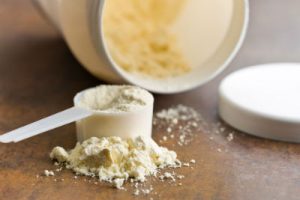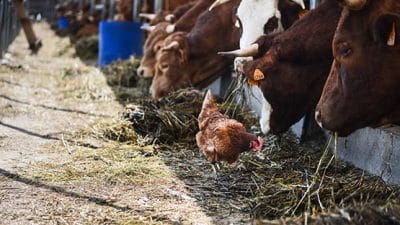
The debate over organic farming and cleaner living has intensified over recent years. With more products than ever being made in a more environmentally friendly way you may already know about grass-fed (or organic) whey. The range of grass-fed whey is as wide as the conventional style, and it comes with a host of added benefits, so let’s get into some helpful hints you can use to pick out the perfect whey.
What is Whey?
We’ll start with a brief summary of what whey actually is and how it comes to be. You’ve probably heard the phrase ‘curds and whey’ used in nursery rhymes and within popular culture. The process used to make these products is commonly used in making cheese. Cow’s milk is mixed with an enzyme to produce curds, literally the curdles that result, and whey, the liquid byproduct. Dehydrating this liquid turns it into a high-protein powder used in the supplements you see on shelves.
Grass-Fed vs Regular Whey
So is it worth going for grass-fed whey over conventional whey proteins? In short yes! Grass-fed contains more compounds that aid the body. It has higher levels of beta-lactoglobulin – the main source of protein in all whey – which gives your immune system a powerful boost. The more natural production also leads to less pollutants and chemicals. Other bonuses from its compounds include antioxidant support and a natural bacteria killer.
Thinking further afield, to the process that goes into each type of whey production, grass-fed whey is better for the planet and the ecosystem. The whey is better for us because the cow’s diets are better for them. The grazing patterns are rotated to keep the soil healthy and the animals have healthier, more natural lives, so they don’t need harmful antibiotics.
Isolates
Protein powder is most commonly found in two forms: concentrate and isolate. Concentrate is the more popularly used version of whey, with high protein and low fat and carbohydrate content, it is the choice of health-seekers chiefly looking for muscle growth and repair. It also assists with dietary goals as it builds lean muscle mass without affecting your meal intake.
Isolates, on the other hand, are used much less and often forgotten about in sports and recreation. However, their component parts pack a bigger and healthier punch than a concentrate. A top end concentrate will contain 80% protein while a comparative isolate will have 90%. Isolates also have extremely low carbohydrate and fat contents, making them better for giving the human body what it needs to grow, without the products that will slow that growth down. While it still does contain lactose it is at a very low level meaning it is the better choice for lactose intolerant athletes and gym goers.
How to Choose
Now that we’ve addressed the benefits of grass-fed whey to yourself, the livestock and the ecosystem as a whole, and looked at the positives of choosing the isolate form over the concentrate, you have the challenge of choosing the best grass-fed whey isolate for you.
Pure Ingredients
The easiest step to take when beginning your selection is to always check the ingredients listed on the product. Whey protein is sold in a variety of flavors – due to the fact it tastes pretty poor on its own – so look for any added sugar or additives that will bring the overall protein levels down. Artificial sweeteners are a particular no-no; the potential effects they have is to actually harm the bacteria in your gut that aid with digestion. Try and keep your ingredients natural.
You also want to look at the carbohydrate levels of the powder. While isolates are a great source of protein you’re better off getting carbs and fibre from pasta, fruit and bread (depending on your goals.) You could also use organic milk for your natural carbs alongside the whey for the best of both in one shake. Carbohydrates create extra amino acid absorption by increasing your insulin level. By picking the powder with the lowest carb count – isolates have an automatic benefit here as we’ve established – you give your body the best chance to produce results.
A key part of whey supplements is the level of amino acids they contain. The three you’ll need your isolate to have are leucine, isoleucine and valine. If the ingredients don’t list these three, in that order, you need to give another product a try.
Check the Seal
Third parties will test whey products for quality and assurances of standards. Companies like Clean Label Project will screen the products on the market for traces of things like pesticides, heavy metals, and any contaminants that could lead to or exacerbate existing health conditions. If you find a powder with the National Sanitation Foundation stamp then it’s worth a second glance – it’s a mark of passing the highest screening tests.
Match Your Needs
With everything previously covered you should have a good idea about what you need from your protein powder. It’s worth investing in tubs of isolate powder rather than ready to drink shakes to save yourself some money. If building muscle or weight gain is what you’re after then a good quality, independently tested, whey isolate is by far the best option for you.
What you should be looking for, regardless of special requirements, are a few essential signs of a quality product. Whey protein should always be the first listed ingredient, with no additives or added sugars, and certification of safety standards authorized by a third party. Go for whey isolates if allergies or intolerances allow. If you get a certified isolate you will definitely be getting enough protein in your shakes from its naturally high percentage (you want at least 20-25 grams of protein per serving for the best and fastest results.)
One last nugget – hydrolyzed whey is a more expensive protein powder that is supposed to be absorbed much faster, but any difference is negligible and you’re better off saving that extra money for the best isolates you can find.










